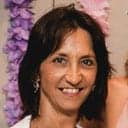A production this month of the play Children of a Lesser God will feature two deaf actors. And the starring role will be played — for the second time — by Gloss actress Miranda Harcourt.
Sheila Gibbons and Bryan Whalley make their professional acting debuts this month, playing characters who are deaf.
Giving their part-authenticity is the least of their worries. Both have been deaf since birth.
Sheila and Bryan have roles in an Auckland production of Children of a Lesser God, which famously hit the film world that actress Marlee Matlin won an Oscar for her portrayal of a young deaf woman, Sarah.
The play focuses on the love between a hearing speech therapist and his deaf student. Sarah refuses to learn lip-reading and to speak, preferring to communicate through sign language.
Mark Medoff wrote the play to provide a role for a deaf actress friend. The part of Sarah has usually been played by a deaf actress in overseas productions.
It is a humorous, sensitive and passionate love story and the deaf roles have helped change attitudes to the deaf.
It is believed to be the first time in New Zealand that deaf actors have taken part in a professional production with hearing actors.
Miranda Harcourt has been seen of late oozing ambition and clawing her way to the top in TV’s Gloss. But southern theatre-goers may remember her as Sarah in productions of Children of a Lesser God in Wellington and Dunedin a year ago.
The 25-year-old actress who won critical acclaim for her performances will again take the role in Auckland.
Miranda, Bryan, Sheila and others are talking about the production as they sit around Miranda’s Auckland flat.
It is an exhaustingly hot day, more suited to swimming than planning. But they are intent and enthusiastic, and nobody seems to notice the weather.
Bryan, 32 years old, is an engineer. He and his identical twin have been deaf from birth.
He started off with an amateur drama group for the deaf in England and took a two-year course to become a drama teacher of deaf and hearing people. He came to New Zealand a year ago for a wedding, stayed on, and now does social work at the Kelston School for the Deaf, helping the pupils with drama skills. He will play Orin, a deaf student at the boarding school in the play.
Sheila is a 25-year-old computer operator who has been deaf from birth as a result of RH (rhesus) blood factor. Her husband, Gavin, has normal hearing, but both his parents are deaf so he is adept at signing. Sheila laughingly says she thought he too was deaf the first time she met him, because his signing was so good.
A member of the Deaf Sign Singers for about six years, Sheila will play Lydia, a deaf girl at the boarding-school.
Both Sheila and Bryan went to the deaf drama classes Miranda Harcourt held last year at Auckland’s Performing Arts Centre. Bryan eventually took over as tutor, and Miranda thought that was great.
“I think if it’s at all possible for a hearing person to have their job taken over by a deaf person then the hearing person should take off,” she says.
Two years ago Miranda knew virtually nothing about the deaf. “I’d met about one deaf person in my life.”
She agreed to play Sarah in the Dunedin-Wellington production without fully appreciating the enormity of the task that lay ahead. Her character refuses to communicate other than in sign language.
Miranda studied sign language for nearly a year before using it in front of an audience. During the process she learned a great deal about deaf people, and her signing knowledge enabled her to teach drama to the deaf.
Miranda thinks that to play the role of Sarah convincingly it’s vital to have an understanding of the deaf. And others associated with the production agree that Bryan and Sheila will heighten that understanding.
Miranda: “It’s wonderful to have Bryan and Sheila there to say ‘No, no, she wouldn’t do that.’”
She adds that she is only playing Sarah because there is as yet no professional deaf actress to take the role.
Sheila is annoyed with the way the deaf are sometimes treated. She points out that the terms “deaf mute” and “deaf and dumb” not only evoke insulting images but are often plain wrong. It is rare that a deaf person is also mute. Sheila and Bryan’s voices may sound unusual — like deaf from birth they have not been able to copy the voices of others — but there is no way anyone sitting in the audience, arguing, hypothesising and planning is not one of them.
The group says most people’s awareness of the deaf is “so, so low”. Hearing people worry about embarrassing themselves and can become self-conscious when they realise their lips are being read.
Says Bryan: “We need time and patience from hearing people. If we get it we can do well.”
The three actors all believe the play will help boost public awareness of the deaf.
Children of a Lesser God is for both hearing and deaf people. Everything that Sarah signs is interpreted by her lover, James. As well as watching the signing, the deaf will be able to read characters’ lips.
James will be played by Nic Farrow who took the same role in the Dunedin-Wellington productions. His sister is deaf so his signing is good.
Ilona Rodgers, also recently seen in Gloss, will play Sarah’s mother. Ilona became interested in theatre and the deaf after she used a deaf interpreter for some performances of her one-woman show, Kid’s Stuff.
Judy McIntosh, who won actress of the year at last year’s Gofta awards for her role in the film Arriving Tuesday, plays a hearing lawyer.
Sylvia Rands who appeared as the wife in TV’s Hanlon will play Miss Franklin, the principal of the boarding-school.
The producer, Ann Andrews, is an independent film-maker who has worked with the deaf before on a workshop and a video. Paul Gittins will direct the production.
The stage manager, Trudi Urlwin, was stage manager, lighting and sound operator and set designer for the Wellington production of the play. She is hearing-impaired.
A great deal of careful planning has gone into the production which is sponsored by Lion Foundation and the Imperial Hotel.
A sign translation of the play, done for the earlier production, will be used for this one.
Even lighting has to be geared to the deaf, for there must be sufficient light on stage for lip reading.
And Miranda is trying to work out a way of cueing deaf performers for their entrances. The backstage actor normally listens to the lines for his cue.
What of fluffed lines or memory blanks? She suggests with a grin that if anyone forgets their line they can always be prompted with a discreet burst of signing.
Photo captions: (1) Bryan Whalley… “We need time and patience from hearing people. If we get it we can do well.” Producer Ann Andrews is in the background. (2) Sheila Gibbons…hurt and annoyed by the labels “deaf mute” and “deaf and dumb.” (3) Miranda Harcourt…won critical acclaim for an earlier performance in Children of a Lesser God. (4, 4a, 4b) A couple of years ago Miranda Harcourt knew virtually nothing about the deaf. Now she has learnt sign language, tutored deaf drama classes and is playing the part of a deaf woman for the second time.


























